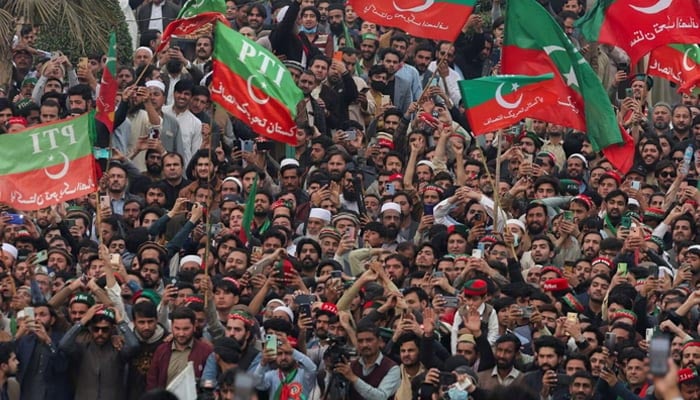The PTI boycott of upcoming by-elections has intensified Pakistan’s political crisis, as the party announced it will not contest in constituencies where its lawmakers were disqualified in the May 9 cases. Declaring the disqualified members as their “true representatives,” the Pakistan Tehreek-e-Insaf leadership framed the boycott as a protest against what it calls political victimization and unfair trials.
Boycott Announced After Party Meeting
The announcement came after a meeting of PTI’s political committee on Wednesday. The party declared that the disqualified lawmakers had made “sacrifices” and faced what it termed political vendetta. As a result, PTI will not participate in by-elections in most constituencies where seats fell vacant after disqualifications.
However, the committee decided to field a candidate in Lahore’s NA-129 constituency. The seat became vacant following the death of Mian Azhar, father of senior PTI leader Hammad Azhar. This decision reflects PTI’s selective engagement with the by-polls while keeping its protest alive.
Read: PCB Voices Alarm Over Pakistan Cricket Decline
ECP Schedules Key By-Elections
The Election Commission of Pakistan (ECP) has already issued the schedule for the by-elections. Polling in NA-66 Wazirabad, NA-129 Lahore-XIII, and PP-87 Mianwali-III will be held on September 18. In contrast, polling for NA-143 Sahiwal-III, NA-185 DG Khan-II, PP-203 Sahiwal-VI, NA-96 Faisalabad-II, NA-104 Faisalabad-X, and PP-98 Faisalabad-I will take place on October 5.
These elections will test the ruling coalition’s strength. The Pakistan Muslim League-Nawaz (PML-N) and Pakistan Peoples Party (PPP) have already announced that they will jointly contest the by-polls, presenting a united front against PTI.
Concerns Over Jail Hearings
In its statement, PTI also raised objections to the daily hearings of the Toshakhana case being conducted inside Adiala Jail. The party described the practice as a violation of fundamental rights and judicial fairness. Leaders argued that holding court sessions inside jail disrupts the defense process and places additional pressure on the accused.
According to PTI, daily hearings limit access to proper legal representation and risk undermining public trust in the justice system. The party stressed that justice must not only be served but must also be seen as fair and impartial.
PTI’s Parliamentary Exit
The boycott decision was accompanied by another significant move. Acting on the instructions of its founding chairman, Imran Khan, PTI announced its resignation from several parliamentary committees. The party withdrew from the National Assembly’s Public Accounts Committee (PAC), various standing committees, and chairmanships.
The political committee stated that Imran Khan had entrusted the body with future political decision-making and strategy planning. Leaders thanked him for his confidence and pledged to continue their struggle both inside and outside the parliamentary system.
Wave of Resignations from Committees
Following the party’s decision, multiple PTI MNAs submitted resignations from their assigned committees. Faisal Amin Khan, brother of Khyber Pakhtunkhwa Chief Minister Ali Amin Gandapur, resigned from all standing committees. These included the Standing Committee on Economic Affairs, the Standing Committee on National Food Security, and the Parliamentary Task Force on SDGs. He formally submitted his resignation to Chief Whip Amir Dogar.
Similarly, another PTI lawmaker, Asif Khan, also resigned from National Assembly committees. He sent his resignation directly to NA Speaker Ayaz Sadiq, further widening the gap between PTI and the parliamentary process.
Political Symbolism in Boycott
By boycotting most by-elections, PTI aims to send a strong message of protest. The party argues that contesting these polls would legitimize what it calls politically motivated disqualifications. Through this move, PTI seeks to frame itself as standing by its disqualified members and refusing to compromise on principles.
However, analysts believe the decision also carries risks. By withdrawing from the electoral process in multiple constituencies, PTI may cede ground to its rivals, particularly the PML-N and PPP alliance. This could weaken PTI’s presence in the National Assembly at a time when its bargaining power is already under strain.
Mixed Strategy Moving Forward
Despite the boycott, PTI’s decision to contest NA-129 Lahore shows a nuanced strategy. The party has chosen a symbolic constituency tied to one of its senior leaders. By competing there, PTI keeps itself engaged in the electoral field while still pressing its protest narrative in other areas.
Party insiders suggest this approach allows PTI to maintain political visibility without appearing to fully endorse the current system, which they accuse of bias. It also signals to supporters that the party is still active in the political arena despite institutional challenges.
Rising Political Tensions
The PTI boycott, coupled with resignations from committees, reflects growing political polarization in Pakistan. With the ruling coalition consolidating its position through joint participation in by-elections, the gap between government and opposition appears to be widening further.
Observers say that the coming weeks will be crucial. The by-elections, along with the ongoing Toshakhana case, will shape PTI’s future strategy and test its ability to balance protest with participation. For now, the party has chosen confrontation over cooperation, setting the stage for another turbulent phase in national politics.
Follow us on Instagram, YouTube, Facebook,, X and TikTok for latest updates
